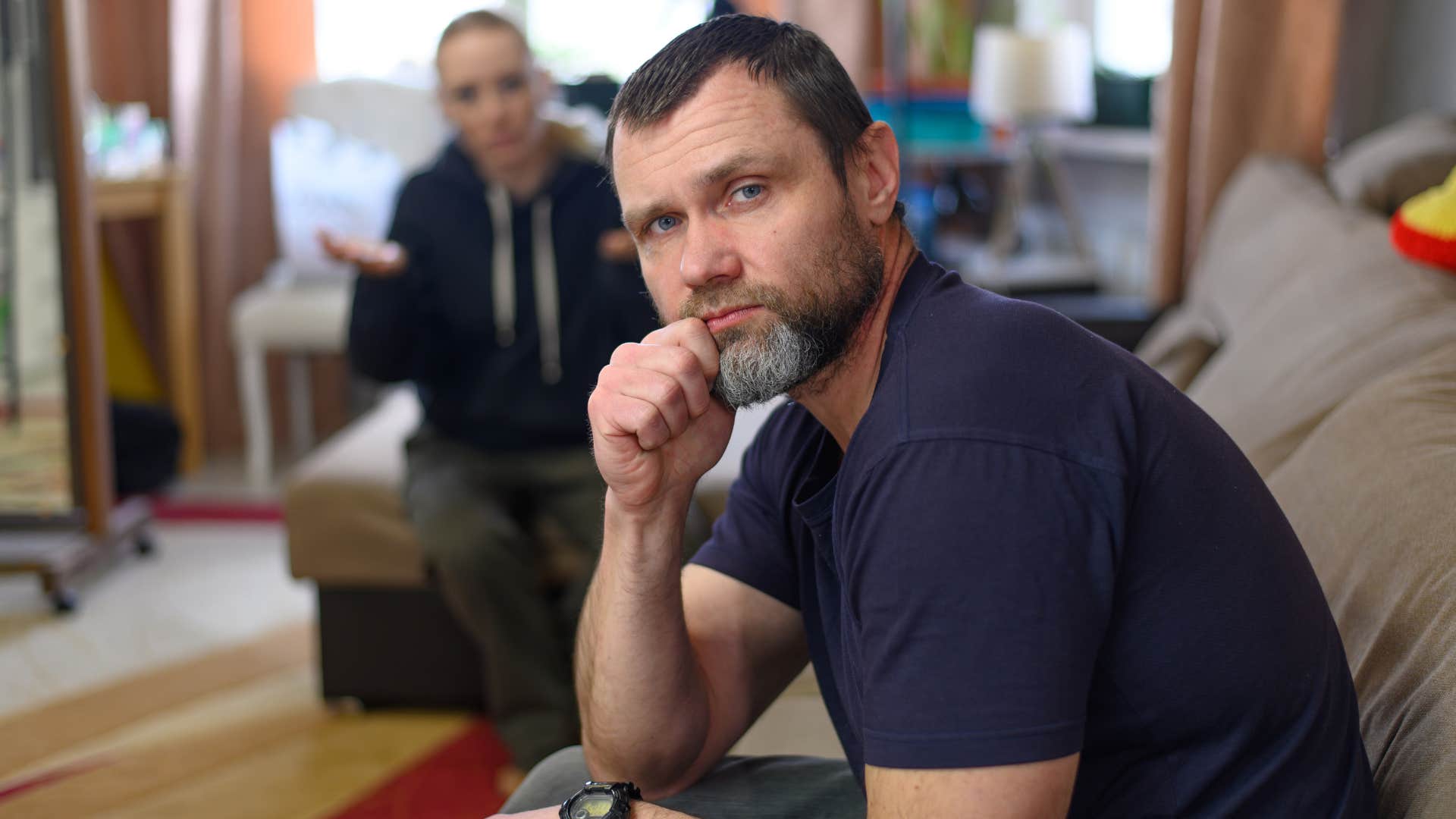12 Subtle Gaslighting Phrases People Say To Make You Question Your Reality
Be wary of people who constantly dismiss your emotions.
 Romanchini | Shutterstock.com
Romanchini | Shutterstock.com While gaslighting tactics have gained widespread interest in media, they have been primarily understudied in psychological research until recent years, according to a Current Directions in Psychological Science journal study. It’s not just an experience that people struggle with in their relationships and tolerate in their passing interactions; it’s a psychological and manipulative tactic that’s often associated with narcissism and toxic partners.
For many people, it’s a constant battle — riddled with subtle gaslighting phrases people say to make you question your reality, along with emotionally draining and unsettling behaviors. By recognizing these patterns, people can safeguard their emotional health with appropriate boundaries and respond in the moment — setting a clear expectation of the respect they demand and the energy they allow in their daily lives.
Here are 12 subtle gaslighting phrases people say to make you question your reality:
1.‘You sound crazy.’
 MAYA LAB | Shutterstock.com
MAYA LAB | Shutterstock.com
A 2023 study from Maricopa Community Colleges revealed that knowing your partner and your relationship dynamic can be beneficial in many ways, from building trust to communicating effectively. Still, it can also lead to a toxic atmosphere with the wrong partner.
If they know that their partner is sensitive to yelling during arguments, they might utilize that discomfort to their advantage, trying to “win” a conflict by raising their voice and silencing their partner. If they know their partner struggles with confidence and a self-assured attitude, they might attack their intelligence or personal experience with a phrase like this.
Gaslighters always try to control the narrative of their relationships — victimizing themselves at all the wrong moments and making other people question whether they’re “the problem” to gain sympathy, control, and a sense of misguided superiority.
2.‘It’s just a joke.’
 People Images Yuri A | Shutterstock.com
People Images Yuri A | Shutterstock.com
While making a joke about a serious topic or in the middle of a conflict might help to release some tension and make everyone more comfortable, according to family therapist Phil Stark, a phrase like this only dismisses and invalidates people experiencing certain emotions.
When a partner makes a mistake or says something hurtful, the emotions you experience should be appropriately acknowledged, not dismissed by resorting to “a joke” as an excuse. Healthy relationships are communicative, supportive, and balanced, not selfish, resentful, and competitive.
3.‘If you loved me, you would.’
 Hryshchyshen Serhii | Shutterstock.com
Hryshchyshen Serhii | Shutterstock.com
Leveraging the health and love of a relationship to get what you want isn’t healthy — whether it’s a platonic friendship or a committed romantic connection. According to family therapist Shemena Johnson, a phrase like this is doing exactly that — creating transactional terms for a relationship that’s supposed to be characterized by balance, compromise, and support.
Often utilized by someone who lived with unmet emotional needs earlier in life, these gaslighters create a sense of security in their relationships by controlling another person’s behaviors and responses. “By controlling others to feel loved and avoid pain,” Johnson adds, “it becomes a self-fulfilling prophecy.”
4.‘This is all your fault.’
 Srdjan Randjelovic | Shutterstock.com
Srdjan Randjelovic | Shutterstock.com
According to Harvard psychologist Dr. Cortney Warren, gaslighters resort to self-victimization to feel a sense of security, even if they’re the ones relying on harmful and manipulative behaviors. By blaming others and shifting guilt, they avoid relationship accountability, sparking an unfair and rightfully resentful dynamic.
By manipulating others in this way, they deceive not only their partners and friends but also themselves, crafting an identity and sense of self-esteem that revolves around their inability to be wrong or “inferior” in their relationships with others.
5.‘You’re overreacting.’
 Dmytro Zinkevych | Shutterstock.com
Dmytro Zinkevych | Shutterstock.com
Failing to take accountability, shifting blame, and dismissing a partner’s experience only creates a toxic relationship dynamic centered around confusion and isolation. Two partners can be in a long-term relationship but still feel incredibly lonely without having their needs met or their true feelings acknowledged.
This subtle gaslighting phrase isn’t always malicious but usually dismissive. Essentially, a gaslighter using this phrase would instead make themselves feel less guilty than create a space where their partner can share their feelings without judgment or shame.
You deserve to have your feelings validated, especially by a partner in a committed relationship. So either demand the space to feel or find someone who celebrates your vulnerability rather than condemns it.
6.‘I’m only telling you this because I care about you.’
 New Africa | Shutterstock.com
New Africa | Shutterstock.com
Along the same lines as “no offense,” this phrase desperately tries to be supportive but comes across as ignorant and self-centered almost every time. Someone who truly cares about their partner will never purposefully say something hurtful disguised as loving or productive.
This manipulation tactic, arguably based on “charming behaviors,” as a 1987 study argues, is exactly how gaslighters create a long-term toxic space in a relationship, where their partner feels equally confused, invested, and isolated. They make it hard for you to pinpoint their malicious intentions—how could they be called out for being toxic or harmful when they only said something rude in the name of love?
7.‘You’re the problem.’
 Violator22 | Shutterstock.com
Violator22 | Shutterstock.com
Gaslighters aren’t just manipulative in their relationships; their need for control also characterizes them. Their controlling attitude manifests itself in a million different ways, from name-calling to isolating themselves to straight-up lying to get what they want. Still, this phrase highlights one of the most common behaviors: self-victimization.
They distort the reality of every conversation and conflict, making their partner out to be “the villain” in every storyline. Their position in the relationship and self-esteem benefits from their partner’s feelings of confusion, shame, and guilt, even if they were the perpetrators of harmful behavior.
According to a study in the Criminology journal, gaslighters also have a low enough sense of self-control that they’ll put themselves in damaging or compromising situations in a relationship to reap the perceived benefits of victimization.
8.‘I didn’t mean it like that.’
 Motortion Films | Shutterstock.com
Motortion Films | Shutterstock.com
Avoiding accountability for their actions, not just in arguments or conflict with excuses and dismissive comments, but in every other aspect of their lives, narcissists and gaslighters are never self-prompted to work on themselves or motivated to start a journey of personal development. They’re more concerned with making themselves look good to other people and seeking external validation than doing the work to “be good” by their standards.
As psychologist Melanie Greenberg suggests, narcissists with gaslighting tendencies cover up their insecurities with self-preserving toxic behaviors and language. They feel more superior and confident by bringing everyone down to their level.
9.‘No, this is what actually happened.’
 Fizkes | Shutterstock.com
Fizkes | Shutterstock.com
While not everyone who uses this phrase is a malicious gaslighter, being more aware of when people in your life try to distort your emotions or overlook your experience with similar language can protect your emotional health and well-being. Your experience is your experience, but that doesn’t mean another person’s truth can't be different.
The root of toxicity in a phrase like this fuels parental estrangement and toxic familial dynamics in adulthood. Adult children feel empowered to confront their parents or get vulnerable about negatively impactful childhood experiences. In contrast, parents must be defensive, believing they’ve experienced a different life than the one they’re being “called out” for.
Some people use this phrase to manipulate the narrative, knowing they’re in the wrong and avoiding accountability, while others genuinely feel defensive about their own experience.
10.‘It wasn’t that bad.’
 Just Life | Shutterstock.com
Just Life | Shutterstock.com
It is important to have a safe space to communicate hardships, struggles, and personal experiences in any kind of relationship. These conversations not only spark impactful connections over shared experiences, but they also help many couples avoid unproductive conflict and resentment down the road from sweeping things under the rug.
However, this constant avoidance and dismissal of other people’s emotions and experiences is what keeps narcissists and gaslighters feeling most confident. Even when they don’t agree with someone’s experience or share the same one, they still hold the power to empathize with the emotions they’re feeling about it — yet they choose to degrade them entirely.
11.‘You started it.’
 Srdjan Randjelovic | Shutterstock.com
Srdjan Randjelovic | Shutterstock.com
People in relationships with gaslighters tend to walk on eggshells around their partners, concerned with the emotional taxation or isolation of conflict or an argument.
Narcissists will do anything to avoid taking accountability, even at the expense of their partner. They create an environment where their partners feel burdened with “keeping the peace” or de-escalating situations. They’re now innately fearful of being vulnerable, as their partner guilts them into taking responsibility for conflict simply for expressing how they feel or opening up a healthy conversation.
12.‘Your therapist put those ideas in your head.’
 ViDI Studio | Shutterstock.com
ViDI Studio | Shutterstock.com
Gaslighters always yearn for control, whether in a relationship, their own life, workplace, or some other aspect of their chaotic life. When they can control the narrative, manipulate people into believing them, and challenge the healthy mindsets and ideas of the people around them, they’re more likely to succeed in asserting their misguided superiority.
Whether it’s a partner or a friend seeking an outside opinion, especially a professional one like a therapist, it can be especially aggravating for a gaslighter benefiting from making you inadvertently question your reality. Like everyone else, as is the underlying theme of our human nature, we fear the things we don’t understand and unsuspectingly demonize the things we fear.
Despite the tendency for many people to push away their fears, whether it be spiders or therapy, many gaslighters get defensive — angered and threatened by “the fear experience” psychology expert Noam Shpancer suggests is the root of our discomfort and anxiety.
Zayda Slabbekoorn is a News and entertainment Writer at YourTango who focuses on health and wellness, social policy, and human interest stories.

